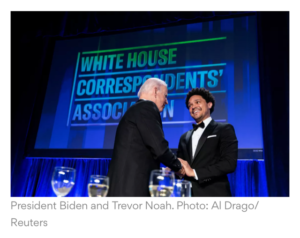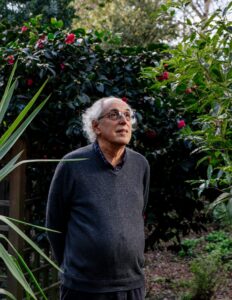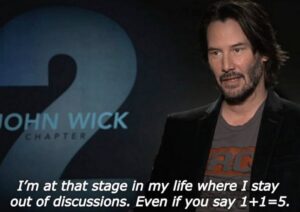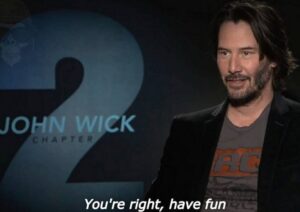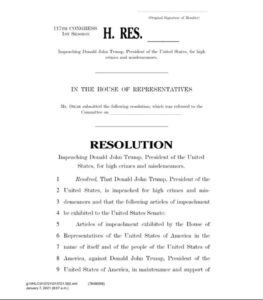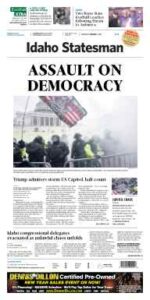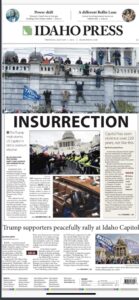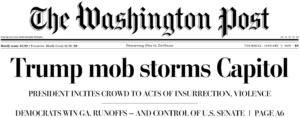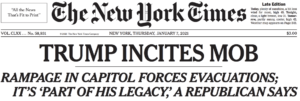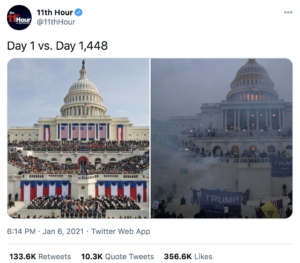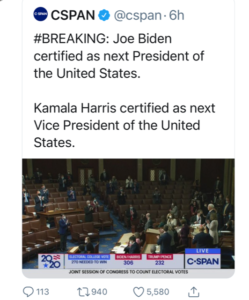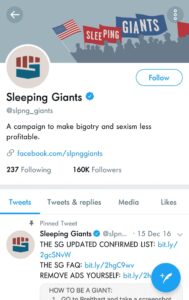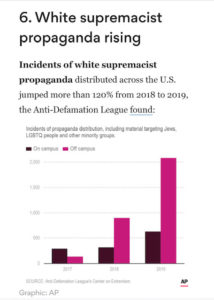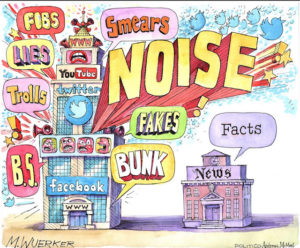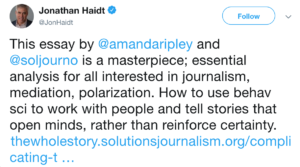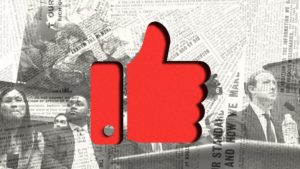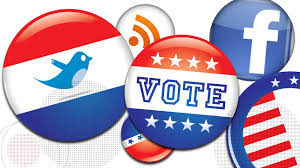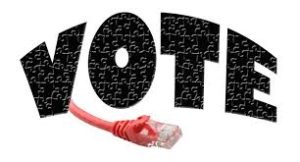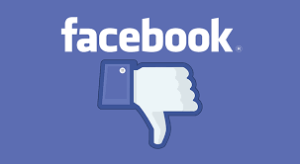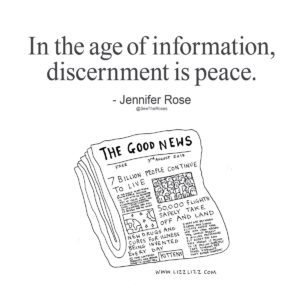disinformation
Democracy dies in darkness.
May 1, 2022Finally, a publication digging deep and giving light to the social and cultural cancer that is Rupert Murdoch’s FOX news and specifically to the hate and darkness that is Tucker Carlson. This is the first of three parts, available to all, that is, not blocked by a pay wall.
Please read and discover how a man who inherited his father’s broadcast talent only to turn his platform into a vehicle for hate and meanness to weaken, perhaps destroy, the fabric of our democracy, “you vs. them”…distrust of other…night after night, reaching three million views each broadcast, with his poisoned tentacles of disinformation, lies, and clouded deceit reaching across platforms and computers. Ideology? Maybe. More likely because he found a message that gave him the opportunity he wanted, to make money, millions. This is what he always wanted to have, especially after being abandoned by his mother, who “didn’t like him.” He allowed this personal darkness to shape his destiny, and ours. -dayle
How Tucker Carlson Stoked White Fear to Conquer Cable
April 30, 2022
American Nationalist: part 1
Reporting was contributed by Larry Buchanan, Weiyi Cai, Ben Decker, Barbara Harvey, Candice Reed, Michael D. Shear and Karen Yourish. Julie Tate contributed research. Nicholas Confessore is a New York-based political and investigative reporter and a staff writer at the Times Magazine, covering the intersection of wealth, power and influence in Washington and beyond. He joined The Times in 2004.
https://www.nytimes.com/2022/04/30/us/tucker-carlson-fox-news.html?smid=url-share
Often think back to this this post on Twitter from an encounter with Carlson at a fly fishing shop in Montana; it brings hope there are, could be, so many more democratic citizens in this country who feel, who know, the same. -dayle
“You are the worst human being known to man.”
—
“Moneyball” for television: a data-driven, audience-first approach to deciding what to cover and how to cover it.
Lachlan Murdoch — sole heir to the throne. He’s widely viewed as having more conservative politics than his father.’
Trevor Noah at the White House Correspondence Dinner, April 30th, 2022:
“What we’re here for is to honor and celebrate the 4th Estate…and what you stand for…what you stand for…an additional check and balance that holds power to account and gives voice to those who otherwise wouldn’t have one.”
[Pick up his closing remarks at 22:45.]
[Image: CNN]
Dirty Laundry
February 9, 2022“It’s all about big dirty money.”
-Adam McKay
(Producer, screenwriter, ‘Don’t Look Up!’)
Corporate owned media. Pretty much all of it. -dayle
The Daily Poster
Corporate Media Is The Misinformation Problem
BY DAVID SIROTA
“Misinformation” is all the rage these days — it’s the topic du jour. Pollssuggest we all agree that it’s a problem, and lately liberals appear most mad at it — but seemingly only at certain kinds of misinformation that originate outside the corporate media sphere.
Notably, the ire is rarely directed at a corporate media machine that systematically rewards and praises the purveyors of misleading propaganda, and continues to flood the country with information sewage.
This selective outrage is a huge problem — because the only way to systematically combat misinformation is to construct a Fourth Estate that develops some trust with the audience. That trust will never be rebuilt if liberals pretend to hate misinformation while they patronize a media establishment that fortifies the pathologies that originally created a credibility crisis.
Consider the past week of media news, while the Joe Rogan controversy dominated headlines:
NBC News hired Stephen Hayes, one of the key architects of Iraq War misinformation, to serve as a political analyst across all of its properties amid a media drumbeat for a war with Russia. Despite Hayes publishing the seminal book amplifying one of the most egregious lies of the Iraq debacle, NBC’s Chuck Todd lauded him as “a principled reporter and analyst who always puts truth and facts above emotion and sentiment.” Meanwhile, CNN just hiredanother Iraq War proponent, right-wing propagandist Jonah Goldberg.
Speaking of CNN, its employees effusively praised their network’s recently deposed president, Jeff Zucker, even after Zucker oversaw the lionization of Andrew Cuomo while the New York governor was shielding his health care industry donors from legal consequences amid a massacre of nursing home residents. Rolling Stone reported that one source said Zucker was personally involved in engineering the Cuomo promotion — and even helped write talking points for the governor.
Corporate media began touting a comeback for Cuomo and his brother, Chris, with no mention of the nursing home catastrophe, as if nothing bad happened over the last two years.
An MSNBC-platformed Washington newsletter blasted out propaganda touting Kroger’s “great pay and benefits” — even as thousands of its employees are struggling to afford basic necessities, and even as the grocery chain bankrolls lobbying groups working to kill union rights legislation.
The New York Times told its readers that President Joe Biden’s “big climate goals depend on Congress” — somehow not mentioning that they also depend on Biden, who has been using his executive authority to expand drilling at a faster pace than President Donald Trump.
Less than two years after the New York Times told its readers that 100,000 pandemic deaths under Trump was “incalculable,” the newspaper has now decided that 900,000 deaths is now a ho-hum story that Americans are bored with. “Though deaths are still mounting, the threat from the virus is moving, for now, farther into the background of daily life for many Americans,” the paper wrote.
MSNBC aired an interview with a New York Times columnist blaming inflation on workers getting COVID relief money, rather than on corporations using their monopoly power to fleece consumers with higher prices that then fund giant executive pay packages and shareholder dividends.
Obviously, multiple wrongs don’t make a right. Rogan platforming public health nonsense and environmental misinformation — and using racial slurs — is not somehow absolved by corporate media concurrently immersing the world in an ocean of self-serving bullshit. His behavior is bad on its own merits. Full stop.
But corporate media doesn’t get to lie the country into a war and a financial crisis, continue enriching right-wing fabulists, offer up news literally “presented by” corporate villains, and then pretend that a podcaster is the singular source of misinformation. And it sure as hell doesn’t get to feign surprise when after decades of lies, almost nobody ends up trusting corporate media about anything.
Despite crocodile tears about “free speech,” none of the central players in the hullabaloo are heroes or victims — they are all making a mint off selling controversy, garbage, and fake outrage. And it’s hardly a surprise that the loudest of them screaming about censorship have had little to say about the most pervasive censorship of all: corporate media’s near-complete erasure of economic and anti-corruption reporting that might offend business sponsors.
The real victim here is the general public.
We need a Fourth Estate that does not reward peddlers of the most outrageous lies — like, say, a Saddam-Al Qaeda “connection” — with prominent gigs.
We need television networks whose anchors don’t run out onto the airwaves to defend top brass amid reports that they helped politicians and political operatives effectively cover up a public health disaster.
And we need an information infrastructure that preferences accurate, verifiable, and indisputable facts so that the public can make informed decisions.
We don’t have much of that right now, in part because political tribalism has taught audiences to selectively love and hate misinformation based on whether it comes from “their” team.
Many liberals love monikers like “believe science” and see themselves as dispassionate protectors of the truth. But let’s be clear: If you’re a liberal who purports to hate misinformation but also cheers on Liz Cheney or Bill Kristol or some other war propagandist as a beacon of integrity just because you see them defending Democrats or bashing Donald Trump on your favorite TV network, then you don’t actually hate misinformation — you just happen to like your misinformation colored blue (even if that misinformation was previously colored neocon red).
Likewise, if you are a Rogan fan or a Fox News maven who purports to want the “real truth” while you cheer him or Tucker Carlson peddling climate denial and vaccine misinformation, then you don’t actually care about truth at all.
And if you’re in corporate media and think it’s OK for your news outlet to routinely skew and cover up the crimes of politicians and business, then you’re not actually interested in journalism’s mission to comfort the afflicted, and afflict the comfortable.
The difference between “media” and actual journalism is the root of the misinformation crisis. We’re drowning in content that is increasingly valued only for its potency in the political wars, rather than judged on its factual merits and its choice of targets. That kind of media content strays farther and farther from reality because it’s about entertaining and inflaming rather than educating and informing.
The answer to misinformation, then, is not some censorship regime, and it’s not more intense fan culture around individual media icons so that everything is a self-enriching culture war between cable TV pundits and Spotify hosts.
The answer is an audience that actually values accurate and necessary information, even if it offends their preconceived notions — an audience that runs away from corporate media outlets that force-feed them lies and liars, and runs toward news organizations that report hard truths.
That’s the kind of news organization we’re working to build here. And we know it’s going to take a long time to build a true independent and trustworthy Fourth Estate in the wreckage of a corporate media landscape, where the flames of bullshit smolder and suffocate the discourse.
But that’s the only way forward.
#
From David.
“Friends:
Yesterday, I learned that I am a nominee for an Academy Award in the best original screenplay category for my work on the film Don’t Look Up. The fact that the film, a climate allegory, has achieved such critical and popular success is a testament to the growing demand for efforts that buck corporate media narratives and challenge power. I am stunned and truly grateful for this Oscar nomination. To celebrate this honor, we are making the replay of our Don’t Look Up live chat with director Adam McKay free for all members — please click here to watch. https://www.dailyposter.com/1-5-live-chat/ Thanks again for your support, and if you are able to financially support our mission, please consider becoming a paying subscriber or donating through our tip jar. Onward!
Rock the boat,
Sirota
“I want to dedicate this song to Rupert Murdoch.”
https://music.youtube.com/watch?v=J_Q8ldj7TKQ&list=RDAMVMJ_Q8ldj7TKQ
Darrell Lee, this is for you. {xo}
~
Dirty Laundry
The Eagles
I make my livin’ off the evenin’ news
Just give me somethin’, somethin’ I can use
People love it when you lose
They love dirty laundry
Well, I coulda’ been an actor, but I wound up here
I just have to look good, I don’t have to be clear
Come and whisper in my ear
Give us dirty laundry
We got the bubble-headed bleached-blonde, comes on at five
She can tell you ’bout the plane crash with a gleam in her eye
It’s interesting when people die
Give us dirty laundry
You don’t really need to find out what’s goin’ on
You don’t really wanna know just how far it’s gone
Just leave well enough alone
Eat your dirty laundry
Dirty little secrets, dirty little lies
We got our dirty little fingers in everybody’s pie
We love to cut you down to size
We love dirty laundry
We can do “The Innuendo”, we can dance and sing
When it’s said and done, we haven’t told you a thing
We all know that crap is king
Give us dirty laundry!
“As a nation, we have begun to float off into a moral void, and all the sermons of all the priests in the country (if they preach at all) are not going to help much. We have got to the point where the promulgation of any kind of moral standard automatically releases an anti-moral response in a whole lot of people. It is not with them, above all, that I am concerned, but with the “good” people, the right-thinking people, who stick to principle, all right, except where it conflicts with the chance to make money. It seems to me that there are very dangerous ambiguities about our democracy in its actual present condition. I wonder to what extent our ideals are not a front for organized selfishness and systemic irresponsibility. If our affluent society ever breaks down and the facade is taken away, what are we going to have left?”
-Thomas Merton, 1961
Free Press, Disinformation, and John Oliver
October 15, 2021
On Sunday’s airing of Last Week Tonight with John Oliver, the show featured a segment on how Facebook and other social-media platforms are failing to address the rising threat of non-English disinformation. Here’s the inside scoop: For the past two months, members of Free Press Action’s staff worked with one of the producers of Last Week Tonight to help focus the show on this very issue!
With a reach of more than 4 million viewers, this Last Week Tonight segment was a milestone accomplishment in our efforts to raise awareness of this critical problem — one that disproportionately harms Black and Brown communities. None of this work would be possible without you and we’re eager to double down on our efforts to fight disinformation in all languages.
Back in late 2020, we began uncovering the depths of non-English disinformation on Facebook. We learned that less than one third of disinformation in Spanish is flagged on Facebook, compared to 70% of English-language content. Since then, we’ve launched the #YaBastaFacebook campaign with our partners to urge the platform to fully enforce its rules against non-English disinformation.
But this problem is hardly limited to Facebook and we haven’t seen enough meaningful action from the other platforms, either.
That’s why we are demanding that Nextdoor, Twitter, YouTube (and Facebook!) come clean about how they’re moderating non-English-language content.
Fight Back with Free Press Action
Disinformation doesn’t just divide us — it can have real life-and-death consequences, especially during the pandemic. And all of us are fed up.
Free Press Action has been leading the charge for accurate news and information from before the Trump era to today. Right now our team is preparing a sophisticated multi-pronged approach to effectively battle disinformation on multiple fronts in the weeks and months ahead — including getting Trump and his PAC kicked off Facebook for good.
Will you donate today to fund this fight? Every gift will be matched dollar for dollar up to $10,000 — but only through Oct. 31.
Please give today!
Jab Duex!
April 15, 2021Please vaccinate.✌🏻
Reading so many accounts of folks who are adamant against vaccination for various reasons, most based on misinformation and disinformation.
Be proactive. Be media literate. Do your research. Talk to your doctors.
For those of us who believe and are grateful for science, if others opt out, this compromises the rest of us who want to acclimate back into an open society, culture, and community void of fear of being around others because of overlying ignorance. Put the politics aside and do your part, not only for our national community, but the global community. Do. Your. Part. -dayle
Re-visiting Fairness in Power for Attention
February 5, 2021During the Nixon administration in the 1970’s, the FCC called the Fairness Doctrine the “single most important requirement of operation in the public interest” (Becker, 2017, para. 8)
Becker, W. (2017, Feb. 23). What’s behind Trump’s war with the press? Huffpost.
Retrieved from https://www.huffingtonpost.com/entry/whats-behind-trumps-war-with-the-press_us_58addf5ce4b0598627a55f9e
Seth Godin:
The internet clearly has a trust problem. As with most things, it helps to start with the Grateful Dead.
After their incarnation as the Warlocks, they became more than a band. It was a family on the road. There were people who gave up their careers to follow them around, living on buses… they were seeing thirty or forty shows a year. You traded tickets, did favors, built relationships. People in the family knew that they’d be seeing each other again soon.
And then, in 1987, Touch of Grey went to #1 (their only top 40 hit) and it attracted a huge (and different) crowd to the shows. Reports were that the intimacy and trust disappeared.
Glen Weyl points out that the internet was started by three tribes, as different from each other as could be. The military was behind the original ARPA (and then DARPA) that built and funded it. Professors at universities around the world were among the early users. And in San Francisco, a group of ‘hippies’ were the builders of some of the first culture online.
Because each of these groups were high-trust communities, it was easy to conclude that the people they’d be engaging online would be too. And so, as the tools of the internet and then the web were built out, they forgot to build a trust layer. Plenty of ways to share files, search, browse, chat and talk, but no way to engage in the very complicated things that humans do around identity and trust.
Humans have been in tribal relationships since before recorded history began. The word “tribe” appears in the Bible more than 300 times. But the internet isn’t a community or a tribe. It’s simply a technology that amplifies some voices and some ideas. When we don’t know who these people are, or if they’re even people, trust erodes.
When a site decides to get big fast, they usually do it by creating a very easy way to join, and they create few barriers to a drive-by anonymous experience. And when they make a profit from this behavior, they do it more. In fact, they amplify it.
Which makes good business in the short run, but lousy public policy.
Twenty years ago, I wrote that if someone goes into a bank wearing a mask (current pandemic aside) we can assume that they’re not there to make a deposit.
And now we’re suffering from the very openness and ease of connection that the internet was built on. Because a collection of angry people talking past each other isn’t a community. Without persistence of presence, some sort of identity and a shared set of ideals, goals and consequences, humans aren’t particularly tempted to bring their best selves to the table.
The system is being architected against our best impulses. Humans understand that local leadership, sacrifice and generosity build community, and that fights and scandals simply create crowds. Countless people are showing up, leading and pushing back, but algorithms are powerful and resilient, and we need some of them to be rebuilt.
Until there’s a correlation between what’s popular or profitable and what’s useful, we’re all going to be paying the price.
Freedom Forum
Opinion by Nicole Hemmer
‘The Fairness Doctrine, a regulation from the late ‘40’s until 1987, dictated balanced coverage of controversial issues on broadcast radio and television. After its repeal, Rush Limbaugh & Fox News quickly became two of the most influential political institutions in the US.
George Orwell
Want to reinstate the FCC’s Fairness Doctrine to help curb the spread of disinformation? Conservatives and liberals both may well want to reconsider that idea, argues a Columbia University scholar.’
What America needs instead is a creative, comprehensive effort by both the private sector and the government to disincentivize conspiracies and misinformation on the many platforms on which they flourish. Some social media companies have begun this work, clearing out QAnon sites and banning some far-right and White power users and communities who pose a threat.That work needs to continue, with careful attention to the biggest offenders who game algorithms and media structures to spread misinformation. But sources of misinformation also need to be demonetized, whether they are YouTube channels or national cable networks, and algorithms tweaked to slow down the spread of extreme content.’
NYTimes
I Talked to the Cassandra of the Internet Age
The internet rewired our brains. He predicted it would.
Posted on twitter 2.4.21:
“I’m going to spend more time writing on this because this is not only a digital detox story. it’s a story about power. And it’s at the center of everything.”
“Michael Goldhaber is the internet prophet you’ve never heard of. Here’s a short list of things he saw coming: the complete dominance of the internet, increased shamelessness in politics, terrorists co-opting social media, the rise of reality television, personal websites, oversharing, personal essay, fandoms and online influencer culture — along with the near destruction of our ability to focus.
Most of this came to him in the mid-1980s, when Mr. Goldhaber, a former theoretical physicist, had a revelation. He was obsessed at the time with what he felt was an information glut — that there was simply more access to news, opinion and forms of entertainment than one could handle. His epiphany was this: One of the most finite resources in the world is human attention. To describe its scarcity, he latched onto what was then an obscure term, coined by a psychologist, Herbert A. Simon: “the attention economy.”
Advertising is part of the attention economy. So are journalism and politics and the streaming business and all the social media platforms. But for Mr. Goldhaber, the term was a bit less theoretical: Every single action we take — calling our grandparents, cleaning up the kitchen or, today, scrolling through our phones — is a transaction. We are taking what precious little attention we have and diverting it toward something. This is a zero-sum proposition, he realized. When you pay attention to one thing, you ignore something else.
The idea changed the way he saw the entire world, and it unsettled him deeply. “I kept thinking that attention is highly desirable and that those who want it tend to want as much as they can possibly get,” Mr. Goldhaber, 78, told me over a Zoom call last month after I tracked him down in Berkeley, Calif. He couldn’t shake the idea that this would cause a deepening inequality.
“When you have attention, you have power, and some people will try and succeed in getting huge amounts of attention, and they would not use it in equal or positive ways.”
More than a decade later, Mr. Goldhaber lives a quiet, mostly retired life. He has hardly any current online footprint, except for a Twitter account he mostly uses to occasionally share posts from politicians. I found him by calling his landline. But we are living in the world he sketched out long ago. Attention has always been currency, but as we’ve begun to live our lives increasingly online, it’s now the currency. Any discussion of power is now, ultimately, a conversation about attention and how we extract it, wield it, waste it, abuse it, sell it, lose it and profit from it.
While Mr. Goldhaber said he wanted to remain hopeful, he was deeply concerned about whether the attention economy and a healthy democracy can coexist. Nuanced policy discussions, he said, will almost certainly get simplified into “meaningless slogans” in order to travel farther online, and politicians will continue to stake out more extreme positions and commandeer news cycles. He said he worried that, as with Brexit, “Rational discussion of what people stand to gain or lose from policies will be drowned out by the loudest and most ridiculous.”
[Alex Kiesling]
Full article:
Truth. Power. Fact?
January 30, 2021This is been going on for while.
1965.
American Trappist monk, writer, theologian, mystic, poet, social activist, and scholar of comparative religion, Thomas Merton:
Man today has lost consciousness of his need for truth. What he seeks is power. Truth is made to serve the ends of power. Truth is of no value unless it is expedient. When truth is not expedient, then it is deliberately manipulated and twisted to serve the aims of the powerful. Objective truth is considered irrelevant. It is dried by the powerful, who can change truth to suit themselves, and bend it this way and that for the sake of ambition and fortune. -Seasons of Celebration
Sound familiar? Only now, social media platforms amplify and exponentially grow disinformation and alternate truth.
Next level?
How do we fix this, repair the deep fractures, the disinformation? Not rhetorical.
‘Ukraine President Volodymyr Zelensky, who was on the other end of the “perfect phone call” that led to President Trump’s first impeachment:’
“I could not even imagine something like this was possible in the United States of America. … We are used to thinking that the U.S. has ideal democratic institutions where power is passed calmly, without war, without revolutions. That it could happen in the United States, no one expected that. … After something like this, I believe it would be very difficult for the world to see the United States as a symbol of democracy in the world.” [AXIOS]
It was a day.
January 7, 2021Impeach and remove.
25th Amendment.
January 6, 2021.
Hurt people hurt people.
Misinformed people hurt people.
Cruel leaders hurt people.
“So anyway, that’s why disinformation is dangerous.” -Brooke Binkowski
L
O
V
E
big.
[Seane Corn]
We must try.
From The Nation:
“This is not America,” a woman said to a small group, her voice shaking. “They’re supposed to shoot BLM, but they’re shooting the patriots.”
LA Times/KUSI TV in San Diego:
The woman shot and killed [seven other people were injured] inside the U.S. Capitol Building during a violent pro-Trump siege Wednesday was an Ocean Beach resident, according to her extended family and media reports.
Her husband confirmed to KUSI that the woman, whose shooting was captured on video, was 35-year-old Ashli Elizabeth Babbitt, and said she was a 14-year Air Force veteran.
Her final post on Twitter:
“Nothing will stop us…they can try and try and try but the storm is here and it is descending upon DC in less that 24 hours…dark to light!”
From Richard Engel, NBC News Foreign Correspondent:
“Police seemed very chummy with the protestors (insurgents) who also seemed to know exactly where to go.”
From journalist Evan Osnos, The New Yorker:
“The moments that surprised me most were not the young thuggish types; that’s eternal. What made me wonder about the future of the country was the presence of the grandmothers.
As darkness approached, police fired a series of flash-bang grenades to shoo people down from the balconies and steps. A heavyset man in a white maga hat stood in a crosswalk, watching the crowd begin to move. He was happy. “They sent a message. That’s enough,” he said. He turned to walk away and added, “Of course, if we come back, it will be with a militia.”
https://www.newyorker.com/news/dispatch/mob-rule-in-the-capitol
Discussing social media and Capitol insurgence and attempted coup.
Clint Watts, former FBI special agent, and Roger McNamee, author of Zucked/Waking up to the Facebook Catastrophe.
Thread from Andrew Yang, Thursday, January 7th:
There are 3 problems with our media that are fueling polarization: 1. The closing of 2,000 local papers, which are typically not very partisan; 2. Cable news maximizing audience share by adopting political stances (Fox); and 3. Social media’s supercharging of conspiracy theories.
The easiest one to address is reopening local papers. There is a bill in Congress – the Local Journalism Sustainability Act from Rep. David Cicilline, Rhode Island, and others – that would help support thousands of local publications. Congress should pass it immediately.
For Cable News we should revive the Fairness Doctrine which the FCC had on the books until 1985 that required that you show both sides of a political issue. It was repealed by Reagan. If there was ever a time to bring it back it’s now.
The most difficult and important is to overhaul social media. We need federal data ownership legislation mirrored after the CPRA in California. There should be ad-free versions of every platform. Section 230 should be amended to not include content that is amplified by algorithm.
The basic problem is that social media creators and companies are rewarded for having more extreme and untrue content. The goal should be to change or balance the incentives. Tech, government, media and NGOs need to collaborate on this to support fact-supported journalism.
There is an opportunity here to support artists, musicians and creatives as well whose work right now the market is ignoring. One element of this ought to be a degree of support for those whose work tries to elevate and inform rather than divide and denigrate.
The big tech companies are essentially quasi-governments unto themselves at this point – the problem is their decisions are driven by maximizing ad revenue, user engagement and profit growth. That’s not the set of incentives you want when deciding what millions regard as truth.
Our government is hopelessly behind on tech. Legislators haven’t had guidance since 1995 when they got rid of the Office of Technology Assessment. The average Senator is 62. Speeches won’t do much against trillions of dollars of financial incentives.
Edward Snowden, President Freedom of the Press:
Never forget that the Freedom of the Press is the very first part of the Bill of Rights. If you’re out on the street claiming to defend the Constitution, the way you do that is by protecting reporters, not attacking them. Even if you hate the media, anything less is un-American.
Outside the Capitol (on Wednesday), Trump supporters took all the equipment from a news media crew (hearing it was AP) and are looking for ways to set it on fire.
It must change. Or go dark.
December 27, 2020From Seth Godin.
Amplify Possibility
“People like us do things like this.”
Social media understands this.
It also knows that people like points, likes and something that feels like popularity.
The social media companies optimized their algorithms for profit. And profit, they figured, would come from engagement. And engagement, they figured, would come from confounding our instincts and rewarding outrage.
Because outrage draws a crowd.
And crowds establish culture.
And a desire to be the leader of a crowd reinforced the cycle.
And so the social networks created a game, a game in which you ‘win’ by being notorious, outrageous or, as they coined the phrase, “authentic.” The whole world is watching, if you’re willing to put on a show.
That’s not how the world actually works. The successful people in your community or your industry (please substitute ‘happy’ for successful in that sentence) don’t act the way the influencers on Twitter, YouTube or Facebook do. That’s all invented, amplified stagecraft, it’s not the actual human condition.
Many of us have an overwhelming need to rubberneck, to slow down when we pass a crash on the highway. This is odd, as most people don’t go out of their way to visit the morgue, just for kicks. And yet…
I hope we’d agree that if people started staging car crashes on the side of the road to get attention, we’d be outraged.
That’s what happening, and the leaders of social networks pretend that they can’t do a thing about it, just as Google pretends that they can’t control the results of their search algorithm.
The shift that the leaders of the social networks need to make is simple. In the long run, it will cost them nothing. And within weeks, it will create a world that’s calmer, happier and more productive.
Amplify possibility. Dial down the spread of disinformation, trolling and division. Make it almost impossible to get famous at the expense of civilization. Embrace the fact that breaking news doesn’t have to be the rhythm of our days. Reward thoughtfulness and consistency and responsibility.
You can do this. Enough already.
Sleeping Giants
October 15, 2020#StopHateForProfit
Matt Rivitz is a founder of Sleeping Giants, a crowd-sourced anti-bigotry and corporate responsibility campaign that started on Twitter as a reaction the intense racism sexism and xenophobia found on Breitbart News on the heels of the 2016 Presidential Election.
The Campaign has exploded, with over a million followers across Twitter and Facebook and Sleeping Giants chapters in 11 other countries and territories including the EU, France, Brazil and Australia, each fight against bigotry and disinformation in media sources in their own countries.
Besides being responsible for now over 4,200 advertiser deciding to leave Breitbart News, Sleeping Giants has also been partially or fully responsible fo the majority of advertisers leaving Bill O’Reilly’s former show on Fox News which resulted in his firing; the departure of dozens of advertisers from Tucker Carlson Tonight on Fox News after a series of anti-Immigrant and racist segments; the removal of conspiracy theorist Alex Jones across nearly every major social platform from YouTube to Facebook and even the “Sleeping giants Amendment”, signed in law in France requiring transparency in advertising placement. Additionally, Sleeping Giants is a founding member of the Stop Hate for Profit campaign, asking for broader responsibility around hate and disinformation on Facebook and Matt personally sits on the Real Facebook Oversite Board, which serves as a check on Facebook’s current oversight boards decisions.
Anonymous until July 17, 2018, Matt’s identity was exposed without his permission by website The Daily Caller, resulting in a coordinated harassment campaign by white supremacists on social media including death threats against his children and wife and staved off a threatened lawsuit by Breitbart News.
Matt continues to lead sleeping Giants as it moves into broader missions around the health of the Internet and social platforms and overall corporate responsibility while continuing his work as a freelance copywriter in advertising.
Just after the 2016 election, an anonymously run Twitter account emerged with a plan to choke off advertising dollars to Breitbart News, the hard-edge, nationalist website closely tied to President Trump’s administration.
The account, named Sleeping Giants, urged people to collect screenshots of ads on Breitbart and then question brands about their support of the site. Sleeping Giants correctly guessed that many companies did not know where their digital ads were running, and advertisers were caught off guard as the account circulated images of blue-chip brands in proximity to headlines like “Birth Control Makes Women Unattractive and Crazy.”
As hundreds of brands blocked their ads from appearing on Breitbart, and the account expanded to put pressure on certain Fox News shows, the people behind Sleeping Giants maintained their anonymity — until this week.
Matt Rivitz, a freelance copywriter in San Francisco who has worked with a range of advertisers, was identified as the account’s creator against his wishes on Monday by The Daily Caller, the conservative news and opinion website co-founded by the Fox News host Tucker Carlson. Mr. Rivitz, 45, confirmed the report on Twitter, where Sleeping Giants has more than 160,000 followers. He runs the account with Nandini Jammi, 29, a freelance copywriter and marketing consultant, along with other still anonymous contributors.
“The way it happened sucks, but I’m super proud of this thing and of all the people who worked on it and all the people who followed it,” Mr. Rivitz said in his first interview since his involvement in the account was revealed. “We’re happy that we made advertisers think a little bit and realize what they’re supporting.”
Mr. Rivitz did not expect to rock the ad and media worlds with Sleeping Giants, which he viewed as an apolitical crusade against hate speech. While he is a registered Democrat, he said he had never been politically active outside of attending “maybe two marches pre-election.” Most of his work for advertisers was focused on television commercials and did not involve social media. He wasn’t a particularly active Twitter user.
But Mr. Rivitz said he was struck by what he viewed as “incredibly bigoted and racist and sexist” content on Breitbart News, including in its comment sections, after his first visit to the site in November 2016. The site had gained prominence because of its ties to Stephen K. Bannon, its former chairman, who was Mr. Trump’s chief strategist.
“I was pretty amazed at the stuff they were printing, and my next thought, being in advertising, was, ‘Who is knowingly supporting this stuff?’” he said. “I thought maybe it would be two to three companies, and I quickly realized within a couple hours it was all placed programmatically.”
Mr. Rivitz was referring to the automated systems that place most online ads and tend to target consumers based on who they are, rather than which site they are visiting.
“It didn’t seem like the advertisers would want to be there,” he said. “I just set up this anonymous Twitter handle and set up an anonymous email and just went for it, because I wanted to contact one advertiser — a progressive loan company from San Francisco.” (The company, Social Finance, quickly pulled its ads.)
Brian Glicklich, a spokesman for Breitbart, said, “The specific allegations they make about our content being racist, sexist or bigoted are false.”
Sleeping Giants contributed to a broader industry reckoningaround how the automated placement and scale of online ads could fund toxic content and extremism. It also highlighted the challenges that companies face in controlling where their ads end up.
Early on, it flagged an advertisement from Workable, a start-up that sells recruiting software, above the Breitbart headline “There’s No Hiring Bias Against Women in Tech, They Just Suck at Interviews.” A screenshot made its way to Nikos Moraitakis, Workable’s chief executive, who said he “nearly had a heart attack” when he saw it. The company, which appeared on the site through one of the Google companies that broker web ads, added Breitbart to its “opt out” list.
The account also gained attention when it highlighted the presence of Kellogg’s ads on Breitbart, which resulted in the breakfast cereal company’s blacklisting the site. In response, Breitbart attempted a #DumpKelloggs campaign.
Mr. Rivitz said the idea behind Sleeping Giants was to inform advertisers, rather than to force boycotts. Breitbart News saw the account’s mission differently.
“Sleeping Giants’ political playbook is to attack opposing speech through harassment and false claims to try to drive it out of business,” Mr. Glicklich said. “They and others have failed at this every time it has been attempted. Democracy flourishes from more conversation, not less, which is why Matt Rivitz’s speech suppression through economic force is among the most reviled techniques of coercion.”
Shortly after Mr. Rivitz started the account, it caught the attention of Ms. Jammi, an American who lives in Berlin. She also visited Breitbart after the election and was startled to see ads from major companies there, thanks to her browsing history. Mr. Rivitz contacted Ms. Jammi through Twitter after seeing a post she had written for Medium on how marketers could blacklist Breitbart, and the two joined forces.
Ms. Jammi, who said her previous interest in politics had amounted to nothing more than following the news, discussed anonymity “early and often” with Mr. Rivitz.
“Initially, we were kind of freaked out at the alt-right influence, and, obviously, one of our primary concerns was staying safe,” she said.
Knowledge of their involvement was limited to a tight circle of family and friends. Mr. Rivitz and Ms. Jammi, who have met in person once, said they each spent three to eight hours a day on Sleeping Giants — posting tweets and corresponding with companies and advertisers — while working at their day jobs. They were vague about how many other people help run the account and its Facebook page, citing privacy concerns and threats.
Since Sleeping Giants got its start, a great number of brands have taken steps to make sure that they do not appear on Breitbart. The site had about 649 advertisers on its website last month, showing around 1,902 different display ads, according to data from Moat Pro, a digital ad intelligence product. That was down from 3,300 advertisers and 11,500 display ads in November 2016. (Sleeping Giants’ count of departed advertisers is closer to 4,000.)
As Sleeping Giants expanded, it broadened its mission to making “bigotry and sexism less profitable” over all. In April 2017, it rallied its following to join the widespread pressure on companies that advertised on “The O’Reilly Factor” after The New York Times reported that Bill O’Reilly, the Fox News show’s host, had settled with at least five women who had accused him of harassment. This year, the account added to the pressure on brands whose commercials appeared on “The Ingraham Angle,” the Fox News show hosted by Laura Ingraham, after she ridiculed a student survivor of the Parkland, Fla., school shooting.
Critics have accused Sleeping Giants of engaging in a form of censorship, a criticism that Mr. Rivitz rejected.
“There are plenty of conservative- and liberal-leaning news organizations that are doing everything in good faith and are talking about policy without bringing divisiveness and racism into it, and that’s where the break is with some of these websites,” he said.
He added that he had received a barrage of threats and harassment in the wake of the Daily Caller article, which also named his wife and friends.
Ms. Jammi, who was not named by The Daily Caller, said she wasn’t sure what kind of harassment to expect, now that her role had been made public. She added that she hoped the attention would raise scrutiny of the big-tech platforms that kept advertisers in the dark.
“Breitbart is where we started, but ultimately the problem is not Breitbart or The Daily Caller — the problem is the tech companies,” Ms. Jammi said. “I fully support that right for them to write whatever they want. What I have a problem with is Facebook and Twitter monetizing it.”
Mr. Rivitz said the Sleeping Giants community had grown so robust that he felt like an administrator. Still, he said, its mission remains the same.
“People can use their free speech to say whatever they want and print whatever they want, and that’s what makes this country great,” Mr. Rivitz said, “but it doesn’t mean they need to get paid for it, especially by an advertiser who didn’t know they were paying for it.”
Journalism Professors Unite
April 4, 2020Every pandemic in history has been followed by a cultural and social blossoming. This one can too, but only if we use this time to reflect on what that blossoming might look like. In the midst of the darkness that’s our slice of light.
~Marianne Williamson
From Journalists and Teachers of Journalism
“Americans consistently rate the Fox News Channel as one of the most trusted TV channels. The average age of Fox News viewers is 65. It is well established that this population incurs the greatest risk from the COVID-19 pandemic. In other words, Fox News viewers are at special risk from the coronavirus.
But viewers of Fox News, including the president of the United States, have been regularly subjected to misinformation relayed by the network — false statements downplaying the prevalence of COVID-19 and its harms; misleading recommendations of activities that people should undertake to protect themselves and others, including casual recommendations of untested drugs; false assessments of the value of measures urged upon the public by their elected political leadership and public health authorities.
The misinformation that reaches the Fox News audience is a danger to public health. Indeed, it is not an overstatement to say that your misreporting endangers your own viewers — and not only them, for in a pandemic, individual behavior affects significant numbers of other people as well.
Yet by commission as well as omission — direct, uncontested misinformation as well as failure to report the true dimensions of the crisis — Fox News has been derelict in its duty to provide clear and accurate information about COVID-19. As the virus spread across the world, Fox News hosts and guests minimized the dangers, accusing Democrats and the media of inflating the dangers (in Sean Hannity’s words) to “bludgeon Trump with this new hoax.” Such commentary encouraged President Trump to trivialize the threat and helped obstruct national, state, and local efforts to limit the coronavirus.
The network’s delinquency was effective. According to a YouGov/Economist poll conducted March 15–17, Americans who pay the most attention to Fox News are much less likely than others to say they are worried about the coronavirus. A Pew Research poll found that 79% of Fox News viewers surveyed believed the media had exaggerated the risks of the virus. 63% of Fox viewers said they believed the virus posed a minor threat to the health of the country. As recently as Sunday, March 22, Fox News host Steve Hilton deplored accurate views of the pandemic, which he attributed to “our ruling class and their TV mouthpieces — whipping up fear over this virus.”
Fox News reporters have done some solid reporting. And the network has recently given some screen time to medical and public health professionals. But Fox News does not clearly distinguish between the authority that should accrue to trained experts, on the one hand, and the authority viewers grant to pundits and politicians for reasons of ideological loyalty. There is a tendency to accept (or reject) them all indiscriminately, for after all, they are talking heads who appear on Fox News, a trusted source of news. When the statements of knowledgeable experts are surrounded by false claims made by pundits and politicians, including President Trump — claims that are not rebutted by knowledgeable people in real time — the overall effect is to mislead a vulnerable public about risks and harms. Misinformation furthers the reach and the dangers of the pandemic. For example, the day after Tucker Carlson touted a flimsy French study on the use of two drugs to treat COVID-19, President Trump touted “very, very encouraging early results” from those drugs, and promoted a third as a possible “game changer.”
The basic purpose of news organizations is to discover and tell the truth. This is especially necessary, and obvious, amid a public health crisis. Television bears a particular responsibility because even more millions than usual look there for reliable information.
Inexcusably, Fox News has violated elementary canons of journalism. In so doing, it has contributed to the spread of a grave pandemic. Urgently, therefore, in the name of both good journalism and public health, we call upon you to help protect the lives of all Americans — including your elderly viewers — by ensuring that the information you deliver is based on scientific facts.”
Signed*,
(If you are a journalist or teacher of journalism and would like to add your name, click here.)
Todd Gitlin, Professor, Chair, Ph. D. Program in Communications, Columbia Journalism School
Mark Feldstein, Eaton Chair of Broadcast Journalism, University of Maryland
Frances FitzGerald, Pulitzer Prize-winning author
Adam Hochschild, Graduate School of Journalism, UC Berkeley
Edward Wasserman, Dean, Graduate School of Journalism, UC Berkeley
Lisa R. Cohen; Columbia Journalism School
Gerald Johnson, Texas Student Media
Susan Moeller, Professor, Merrill College of Journalism, UMD, College Park
Maurine Beasley, University of Maryland College Park
Michael Deas, Medill School of Journalism, Northwestern University
Ivan Meyers, Medill School at Northwestern University
Helen Benedict, Professor, Graduate School of Journalism, Columbia University
Hendrik Hertzberg, longtime staff writer and editor, The New Yorker
Lewis Friedland, Vilas Distinguished Achievement Professor, School of Journalism and Mass Com, UW-Madison
Dr. Tom Mascaro, Ph.D. Bowling Green State University, School of Media & Communication
Tom Bettag, Visiting Fellow, University of Maryland
Betty H Winfield University of Missouri Curators’ Professor Emerita
Frank D. Durham, University of Iowa
Dennis Darling Professor, School of Journalism, The University of Texas at Austin
Jonathan Weiner, Maxwell M. Geffen Professor of Medical and Scientific Journalism Columbia Journalism School
Ari L. Goldman, professor, Columba University Graduate School of Journalism
Jennifer Kahn, Narrative Program Lead, Graduate School of Journalism, UC Berkeley
Meenakshi Gigi Durham, Professor, School of Journalism and Mass Communication, University of Iowa
Deirdre English, Graduate School of Journalism, UC Berkeley
Rosental C Alves, University of Texas at Austin
Pauline Dakin, Ass. Professor, University of King’s College, Halifax, Nova Scotia
Nina Alvarez, Assistant Professor, Columbia Journalism School
Travis Vogan, University of Iowa
Ali Noor Mohamed, United Arab Emirates University
Linda Steiner, Acting Director, Ph.D. Studies; Professor, Phillip Merrill College of Journalism, University of Maryland, College Park
Lucas Graves, School of Journalism & Mass Communication, UW — Madison
Anna Everett, Professor Emeritus, University of California, Santa Barbara
Richard Appelbaum, Fielding Graduate University; UCSB Emeritus
Tom Collinger, Northwestern University, Medill School of Journalism
Wenhong Chen, Founding Co-director, Center for Entertainment and Media Industries Associate Professor ofMedia Studies and Sociology, Moody College of Communication The University of Texas at Austin
LynNell Hancock, Professor, Columbia University Graduate School of Journalism
Donna DeCesare, Associate Professor, School of Journalism, University of Texas at Austin
Barbie Zelizer, Annenberg School for Communication, University of Pennsylvania
Michael Murray, UM Curators Distinguished Professor Emeritus, UM-St. Louis
Michael Schudson, Columbia University
Martin Kaplan, Norman Lear Chair in Entertainment, Media and Society, USC Annenberg School for Communication and Journalism
Brian Ekdale, University of Iowa
Gina Masullo, University of Texas at Austin
Krishnan Vasudevan, Assistant Professor, Philip Merrill College of Journalism, University of Maryland at College Park
Harold Evans, former editor Sunday Times and The Times, London
Chuck Howell, Librarian for Journalism & Communication Studies, University of Maryland
Clarke L. Caywood Ph.D, Professor Medill School of Journalism Media Integrated Marketing Communications
Andie Tucher, Director, PhD program in Communications, Columbia Journalism School
Kalyani Chadha, Associate Professor, University of Maryland
Denis P. Gorman, Freelance Journalist
Jon Marshall, Northwestern University
Kevin Lerner, Marist College
Joel Whitebook, Columbia University Center for Psychoanalytic Training and Research
Abe Peck, Prof. Emeritus in Service, Medill School of Journalism, Media, Integrated Marketing Communications, Northwestern University
Carrie Lozano, Graduate School of Journalism, UC Berkeley
Susie Linfield, Dept of Journalism, New York University
Charles Berret, University of British Columbia
Jay Rosen, Arthur L. Carter Journalism Institute, New York University
Maggie Rivas-Rodriguez, Professor of Journalism, The University of Texas at Austin
Joseph Straubhaar, Professor, School of Journalism, University of Texas, Austin
Edward C Malthouse, Haven Professor, Medill School of Journalism, Media and IMC, Northwestern University
Mitchell Stephens, Professor of Journalism, New York University
Patricia Loew, Ph.D. Professor, Medill School of Journalism, Northwestern University
Richard Fine, Professor of English, Virginia Commonwealth University
John E. Newhagen Associate Prof. Emeritus University of Marylans
Caryn Ward, Northwestern University, Medill School of Journalism, Media and Integrated Marketing and Communication
David Hajdu, Professor, Columbia Graduate School of Journalism
Naeemul Hassan, Assistant Professor, University of Maryland
Stephen D. Reese, School of Journalism & Media, U of Texas at Austin
Kevin Klose, Professor, University of Maryland
John Vivian, Winona State University
Sue Robinson, Helen Firstbrook Franklin Professor of Journalism, University of Wisconsin-Madison
Thomas P. Oates, University of Iowa
Samuel Freedman, Columbia Journalism School
Susan Mango Curtis, Northwestern University Medill School of Journalism, Northwestern University
Prof. Robert S. Boynton, Arthur L. Carter Journalism Institute at NYU
Leonard Steinhorn, Professor of Communication and Affiliate Professor of History, American University
J.A. Adande, Medill School, Northwestern
Victor Pickard, University of Pennsylvania
Summer Harlow, Assistant Professor, University of Houston
Danielle K. Kilgo, Ph.D., Indiana University
Jack Doppelt, Northwestern University
Gerry Lanosga, The Media School, Indiana University
Martin Riedl, PhD Candidate, School of Journalism, The University of Texas at Austin
Rich Shumate, School of Media, Western Kentucky University
Mac McKerral, School of Media, Western Kentucky University
Mel Coffee, University of Maryland
David J. Vergobbi, University of Utah
Tom Boll, part-time instructor, S.I. Newhouse School of Public Communications, Syracuse University
Dannagal G. Young, Associate Professor of Communication and Political Science, University of Delaware
Ken Light, Reva and David Logan Professor of Photojournalism, UC Berkeley Graduate School of Journalism
George Harmon, emeritus faculty, Medill School of Journalism
Rachel Young, University of Iowa
Carol M. Liebler, Professor, Newhouse School, Syracuse University
Kyu Ho Youm, University of Oregon
Julianne H Newton, University of Oregon
Bethany Swain, University of Maryland
Gi Woong Yun, Reynolds School of Journalism, University of Nevada, Reno
Thomas E. Winski, MJE Retired Assistant Professor of Journalism, Emporia State University
Roy L Moore, Professor (retired), Middle TN State University
Ira Chinoy, Philip Merrill College of Journalism, University of Maryland
Jay Edwin Gillette, Ph.D., Professor Emeritus of Information and Communication Sciences Center for Information and Communication Sciences, Ball State University
Michael Anderson, retired journalist
Kimberley Shoaf, Professor of Public Health, University of Utah
Erica Ciszek, University of Texas at Austin
Daniel C. Hallin, University of California, San Diego
Keith W. Strandberg, Webster University, Geneva
Sophie Furley, Editor
Frank Sesno, Director, George Washington University School of Media and Public Affairs
Timothy V. Klein, Louisiana State University
*Affiliations listed for identification only.
https://medium.com/@journalismprofs/open-letter-to-the-murdochs-9334e775a992
‘…because the government lied, more people died.’
February 28, 2020‘An expert on the 1918 Spanish Flu epidemic wrote a piece 2 yrs ago on lessons of why that outbreak was so deadly.
His conclusion: govt officials, desperate to keep morale up during WWI, didn’t tell the truth.
And because the government lied, more people died.’
-Ian Bassin, former associate White House Council
How the Horrific 1918 Flu Spread Across America
The toll of history’s worst epidemic surpasses all the military deaths in World War I and World War II combined. And it may have begun in the United States
Although some researchers argue that the 1918 pandemic began elsewhere, in France in 1916 or China and Vietnam in 1917, many other studies indicate a U.S. origin. The Australian immunologist and Nobel laureate Macfarlane Burnet, who spent most of his career studying influenza, concluded the evidence was “strongly suggestive” that the disease started in the United States and spread to France with “the arrival of American troops.” Camp Funston had long been considered as the site where the pandemic started until my historical research, published in 2004, pointed to an earlier outbreak in Haskell County.
Wherever it began, the pandemic lasted just 15 months but was the deadliest disease outbreak in human history, killing between 50 million and 100 million people worldwide, according to the most widely cited analysis. An exact global number is unlikely ever to be determined, given the lack of suitable records in much of the world at that time. But it’s clear the pandemic killed more people in a year than AIDS has killed in 40 years, more than the bubonic plague killed in a century.
The impact of the pandemic on the United States is sobering to contemplate: Some 670,000 Americans died.
A ravaged lung (at the National Museum of Health and Medicine) from a U.S. soldier killed by flu in 1918.(Cade Martin)
We are arguably as vulnerable—or more vulnerable—to another pandemic as we were in 1918. Today top public health experts routinely rank influenza as potentially the most dangerous “emerging” health threat we face. Earlier this year, upon leaving his post as head of the Centers for Disease Control and Prevention, Tom Frieden was asked what scared him the most, what kept him up at night. “The biggest concern is always for an influenza pandemic…[It] really is the worst-case scenario.” So the tragic events of 100 years ago have a surprising urgency—especially since the most crucial lessons to be learned from the disaster have yet to be absorbed.
Against this background, while influenza bled into American life, public health officials, determined to keep morale up, began to lie.
https://www.smithsonianmag.com/history/journal-plague-year-180965222/
#MustRead ~ Information Ecosystem
February 12, 2020Truths kindle light for truths.
-Julius Caesar
“What you have is a presidential campaign that is pushing lies and distortions and conspiracy theories into the bloodstream at an unprecedented rate,” says Atlantic writer McKay Coppins.
“Eventually, the fear of covert propaganda inflicts as much damage as the propaganda itself.”
The Atlantic
The Billion-Dollar Disinformation Campaign to Reelect the President
How new technologies and techniques pioneered by dictators will shape the 2020 election
“One day last fall, I sat down to create a new Facebook account. I picked a forgettable name, snapped a profile pic with my face obscured, and clicked “Like” on the official pages of Donald Trump and his reelection campaign. Facebook’s algorithm prodded me to follow Ann Coulter, Fox Business, and a variety of fan pages with names like “In Trump We Trust.” I complied. I also gave my cellphone number to the Trump campaign, and joined a handful of private Facebook groups for MAGA diehards, one of which required an application that seemed designed to screen out interlopers.
It’s been reported that the RNC and the Trump campaign have compiled an average of 3,000 data points on every voter in America. And so that means everything from what you like to watch on TV, what kind of stores you shop at, whether you’ve been to a gun show or own a gun. They’ve compiled all this data, and they can use it to carefully tailor messages just for you. And I should say that this is not unique to the Trump campaign. This isn’t something Brad Parscale invented. Barack Obama’s campaign famously did it in 2012. The Clinton campaign did it as well in 2016. But the Trump campaign’s effort was different, both because it was much more extensive and also, frankly, a lot more brazen.
The Trump campaign is planning to spend more than $1 billion, and it will be aided by a vast coalition of partisan media, outside political groups, and enterprising freelance operatives. These pro-Trump forces are poised to wage what could be the most extensive disinformation campaign in U.S. history. Whether or not it succeeds in reelecting the president, the wreckage it leaves behind could be irreparable.”
The Death Star
The campaign is run from the 14th floor of a gleaming, modern office tower in Rosslyn, Virginia, just outside Washington, D.C. Glass-walled conference rooms look out on the Potomac River. Rows of sleek monitors line the main office space. Unlike the bootstrap operation that first got Trump elected—with its motley band of B-teamers toiling in an unfinished space in Trump Tower—his 2020 enterprise is heavily funded, technologically sophisticated, and staffed with dozens of experienced operatives. One Republican strategist referred to it, admiringly, as “the Death Star.”
Next hit? Local News
Parscale has indicated that he plans to open up a new front in this war: local news. Last year, he said the campaign intends to train “swarms of surrogates” to undermine negative coverage from local TV stations and newspapers. Polls have long found that Americans across the political spectrum trust local news more than national media. If the campaign has its way, that trust will be eroded by November. “We can actually build up and fight with the local newspapers,” Parscale told donors, according to a recording provided by The Palm Beach Post. “So we’re not just fighting on Fox News, CNN, and MSNBC with the same 700,000 people watching every day.”
Running parallel to this effort, some conservatives have been experimenting with a scheme to exploit the credibility of local journalism. Over the past few years, hundreds of websites with innocuous-sounding names like the Arizona Monitor and The Kalamazoo Times have begun popping up. At first glance, they look like regular publications, complete with community notices and coverage of schools. But look closer and you’ll find that there are often no mastheads, few if any bylines, and no addresses for local offices. Many of them are organs of Republican lobbying groups; others belong to a mysterious company called Locality Labs, which is run by a conservative activist in Illinois. Readers are given no indication that these sites have political agendas—which is precisely what makes them valuable.
Censorship Through Noise
The political theorist Hannah Arendt once wrote that the most successful totalitarian leaders of the 20th century instilled in their followers “a mixture of gullibility and cynicism.” When they were lied to, they chose to believe it. When a lie was debunked, they claimed they’d known all along—and would then “admire the leaders for their superior tactical cleverness.” Over time, Arendt wrote, the onslaught of propaganda conditioned people to “believe everything and nothing, think that everything was possible and that nothing was true.”
[full read]
https://www.theatlantic.com/magazine/archive/2020/03/the-2020-disinformation-war/605530/
President Barack Obama: Even if the methods are new, sowing the seeds of doubt, division, and discord to turn Americans against each other is an old trick. The antidote is citizenship: to get engaged, organized, mobilized, and to vote – on every level, in every election. 02.11.20 [twitter]
Fresh Air with Terry Gross
“The 2020 Disinformation War,” is in the current issue of The Atlantic, where McKay Coppins is a staff writer. He writes about how the Trump campaign and a vast coalition of partisan media, outside political groups and freelance operatives are poised to wage what could be the most extensive disinformation campaign in U.S. history. As part of his research, Coppins tried to live in the same media and social media world as Trump supporters so he could monitor the information or disinformation they were receiving.”
Coppins:
“A lot of these illiberal leaders have discovered that in the Internet age, in the social media age, in what scholars call the information abundance age, it’s a lot easier to harness the power of social media for their own means. So rather than shutting down dissenting voices, they’ve learned to use the democratizing power of social media to jam the signals or sow confusion. They don’t have to, you know, silence the dissident who’s shouting in the streets; they can actually just drown him out. And I think that over time, you’ve seen this in other countries – certainly in the Baltic states, in Eastern Europe, Russia.
If journalism and facts are treated as equal in credibility to partisan propaganda or lies from political leaders, if it’s all one level playing field, then it becomes almost impossible for political leaders to be held accountable for their actions because you have a population that’s either disengaged or distracted or confused and unable to kind of respond to the various corruptions and scandals and things that they’re getting away with.
Matthew Boyle, an editor at Breitbart who is often involved in this effort, gave a speech at the Heritage Foundation in 2017 where he said, journalistic integrity is dead. There is no such thing anymore. So everything now is about weaponization of information. And that’s really at the root of this whole enterprise. They’re not trying to make journalists be better or get them to do their jobs better. They’re trying to discredit them and weaponize information and make it so that journalism and facts are seen as on par with political talking points and propaganda.”
AP
AXIOS
Persevere Beyond the Noise
January 30, 2020https://www.emersoncollective.com/media-journalism/
AXIOS:
Emerson Collective initial launch partner for new NowThis division
NowThis, the millennial social video media outlet that’s part of Group Nine Media, will announce today the launch of NowThis Impact, a new editorial division that covers social issues and is underwritten by non-profits.
Why it matters: Underwriting editorial content is becoming a bigger trend as more philanthropy and non-profit money floods into journalism.
Details: Emerson Collective, a social change organization founded by Laurene Powell Jobs, will serve as the company’s launch partner.
- NowThis is looking to announce additional underwriters in coming months.
- It will work with issue experts to form content partnerships around certain issues that contain specific calls to action.
- The new product aims to meet the content appetites of NowThis’ audience of progressive and civically-minded millennials.
Be smart: It’s not the first time Group Nine has dabbled in “call-to-action” media/journalism. Its animal franchise, The Dodo, has in the past directed its audience to adoption resources.
Disclosure: Emerson Collective is an investor in Axios.
A C T I V E L I S T E N I N G
How To Listen To People You Disagree With
JOURNALISM
Early last year, Amanda Ripley had a revelation: she wasn’t a great listener. “It was hugely disturbing, because it’s my job,” she says. Ripley is a journalist who writes for The Atlantic and The Washington Post. She was studying conflict as a way to understand political polarization. Through her research, she realized that one key to understanding – and sometimes even resolving – conflict is whether the parties involved feel heard or not.
Most people aren’t great listeners – including doctors and bosses and all kinds of people whose job requires listening. As Ripley sees it, journalists are conditioned to over-simplify polarizing topics or complex characters so that readers can more easily understand the reporting. But in doing so, journalists flatten incredibly complicated, nuanced topics and leave people more entrenched than ever. Ripley wrote about this revelation in a viral piece last year, Complicating the Narratives.
Now, Ripley, an Emerson Collective Senior Fellow, is working with the Solutions Journalism Network to train journalists on how to conduct better interviews, particularly about polarizing subjects. Ripley’s work is part of a larger movement to bridge political and cultural divides and revive healthy democractic debate in the U.S.
Ripley recently spoke with Patrick D’Arcy, Emerson Collective’s Director of Fellowships and Portfolio Communications, about the broader implications of her research on conflict and the essential, overlooked role of listening in a healthy democracy – and the Thanksgiving dinner table.
People will put up with a lot of difference if they feel heard. People will open up to different ideas and opinions.
https://www.emersoncollective.com/articles/2019/11/how-to-listen-to-people-you-disagree-with/
Essay: https://thewholestory.solutionsjournalism.org/22-questions-that-complicate-the-narrative-47f2649efa0e
“What do you want to understand? Conversation techniques, interview questions, and stellar story examples born from a conflict mediation training — for journalists”
https://youtu.be/FtCfGswZSjg
~
CONSIDER
Senator Cory Booker:
“This is a moral moment. The moral vandal that’s in the White House right now, he may win this day, but he will not win our nation. We are America. We’re going to find a way to regroup, heal, [and] be the moral nation that I know we are.”
“Never stop being a prisoner of hope.”
Marianne Williamson:
“The president’s defense team arguing for what is basically unlimited presidential power is chilling. Even if they get away with it – which they probably will – it’s important to remember that we the voters are the ultimate judge and jury. We’ll deliver our judgement in November.”
Philosopher/author Martha Nussbaum:
“To be a good human being is to have a kind of openness to the world, an ability to trust uncertain things beyond your own control.”
UPDATE: #DeleteFacebook
January 12, 2020“Facebook is a crime scene.”
“Last year data surpassed oil in value.”
“Democracy for sale.”
Democracy Now! this past week aired a 6-part report focusing on a new Oscar-shortlisted documentary called “The Great Hack” which argues Cambridge Analytica has played a significant role not just in the U.S. election but in elections across the globe. The company harvested some 87 million Facebook profiles without the users’ knowledge or consent and used the data to sway voters during the 2016 campaign. Data organizations have 5,000 data points on every U.S. voter. DN! spoke with the directors of “The Great Hack,” Jehane Noujaim and Karim Amer, as well as former Cambridge Analytica employee Brittany Kaiser and propaganda researcher Emma Briant.
https://www.democracynow.org/2020/1/10/2020_election_digital_manipulation_cambridge_analytica
GUESTS:
- Brittany Kaiser a Cambridge Analytica whistleblower who is featured in the documentary The Great Hack. Her book is titled Targeted: The Cambridge Analytica Whistleblower’s Inside Story of How Big Data, Trump, and Facebook Broke Democracy and How It Can Happen Again.
- Karim Amer co-director of The Great Hack, which has been shortlisted for an Academy Award.
- Jehane Noujaim co-director of The Great Hack, which has been shortlisted for an Academy Award. Her previous films include The Square and Control Room
IMPORTANT TAKEAWAYS:
Emma Briant: “I just wanted to make a point about how important this is for ordinary Americans to understand the significance for their own lives, as well, because I think some people hear this, and they think, “Oh, tech, this is maybe quite abstract,” or, you know, they may feel that other issues are more important when it comes to election time. But I want to make the point that, actually, you know what? This subject is about all of those other issues. I also think that we need an independent regulator for the tech industry and also a separate one for the influence industry. So, America has some regulation when it comes to lobbying. In the U.K., we have none. And quite often, you know, American companies will partner with a British company in order to be able to get around doing things, for instance. We have to make sure that different countries’ jurisdictions cannot be, you know, abused in order to make something happen that would be forbidden in another country.
We need to make sure that we’re also tackling how money is being channeled into these campaigns, because, actually, there’s an awful lot we could do that isn’t just about censoring or taking down content, but that actually is, you know, about making sure that the money isn’t being funneled in to the — to fund these actual campaigns. If we knew who was behind them, if we were able to show which companies were working on them and what other interests they might have, then I think this would really open up the system to better journalism, to better — you know, more accountability.
And the issue isn’t just about what’s happening on the platforms, although that is a big part of it. We have to think about, you know, the whole infrastructure.”
Karim Amer: “I think what’s even more worrisome is that a lot of our technology companies, I would say, are incentivized now by the polarization of the American people. The more polarized, the more you spend time on the platform checking the endless feed, the more you’re hooked, the more you’re glued, the more their KPI at the end of the year, which says number of hours spent per user on platform, goes up. And as long as that’s the model, then everything is designed, from the way you interact with these devices to the way your news is sorted and fed to you, to keep you on, as hooked as possible, in this completely unregulated, unfiltered way — under the guise of freedom of speech when it’s selectively there for them to protect their interests further. And I think that’s very worrisome.
And we have to ask these technology companies: Would there be a Silicon Valley if the ideals of the open society were not in place? Would Silicon Valley be this refuge for the world’s engineers of the future to come reimagine what the future could look like, had there not been the foundations of an open society? There would not be. Yet the same people who are profiting off of these ideals protecting them feel no responsibility in their preservation. And that is what is so upsetting. That is what is so criminal. And that is why we cannot look to them for leadership on how to get out of this.
We have to look at the regulation. You know, if Facebook was fined $50 billion instead of five, I guarantee you we wouldn’t be having this conversation right now.”
Jehane Noujaim: “Democracy has been broken. And our first vote is happening in 28 days, and nothing has changed. No election laws have changed. Facebook’s a crime scene. No research, nothing has come out. We don’t understand it yet. This was why we felt so passionate about making this film, because it’s invisible. How do you make the invisible visible? And this is why Brittany is releasing these files, because unless we understand the tactics, which are currently being used again, right now, as we speak, same people involved, then we can’t change this.”
Brittany Kaiser: Former Cambridge Analytica employees are currently supporting TRUMP 2020. They are working in countries all around the world with individual political consultancies, marketing consultancies, strategic communication firms […] there are now hundreds of these companies all around the world. […] And I’m absolutely terrified to see what is going to happen on our newsfeeds between now and November 3rd.
What news and information consumers can do:
- Educate. Become digitally literate.
- Look on the website of the Center for Humane Technology. https://humanetech.com
- Look on the website of the Electronic Frontier Foundation. https://www.eff.org
- Look at the Beacon Trust website. https://www.beacontrustnetwork.com/our-team
- Read the Contract for the Web. https://contractfortheweb.org
- Visit The Center for Media Literacy. https://www.medialit.org
There is a new concept called DQ. It means digital intelligence, like IQ or EQ. And its a new global standard that my new foundation, the Own Your Date Foundation, is helping roll out in schools in America, that actually teach kids these things, ow to prevent cyberbullying and bet ethical online and identify fake news and disinformation.
WE HAVE TO EMPOWER OURSELVES TO PROTECT OURSELVES.
CONTACT YOUR LEGISLATORS.
(‘Just type in ‘contact you’re legislator.’)
New Year’s Eve 2019.
Hi friends. This is my final post on fb. 2.2 billion people, a third of humanity, log on across the planet every hour, I don’t think Zuck will miss me much. Nonetheless, 17 million Americans have left FB in the last two years because of disinformation and political manipulation. Mark Zuckerberg made an additional $27 billion last year alone; he won’t be changing his behaviors any time soon. He throws all that he does under the free speech/innovation bus. His modus operandi has always been to act first, apologize later. Literal early company motto: ‘Move fast and break things.’ Based on past behaviors and weak rhetoric, I don’t think he has the moral compass to steer a moral path. He doesn’t have the emotional or compassionate intelligence to consider the meaning of truth, the limits of free speech, and the origins of violence. Peter Thiel, a billionaire who sits on his board, is the guy who once wrote democracy was weakened when women received the right to vote. Good guy. Zuckerberg is now at the center of a full-fledged debate about the moral character of Silicon Valley and the conscience of its leaders.
In their opinion piece for January 1st, 2020, Idaho Mountain Express offered their New Year’s resolution for fb and Zuckerberg: “To take legal responsibility for what his platform has wrought by making it a publisher instead of a filthy rich exploiter of unsuspecting Americans.” Right on.
In 1915, Louis Brandeis, the reformer and future Supreme Court Justice, testified before a congressional committee about the dangers of corporations large enough that they could achieve a level of near-sovereignty “so powerful that the ordinary social and industrial forces existing are insufficient to cope with it.” He called this the “curse of bigness.” Tim Wu, a Columbia law-school professor and the author of a forthcoming book inspired by Brandeis’s phrase, said “Today, no sector exemplifies more clearly the threat of bigness to democracy than Big Tech.” He added, “When a concentrated private power has such control over what we see and hear, it has a power that rivals or exceeds that of elected government.”
A healthy market should produce competitors to Facebook that position themselves as ethical alternatives, collecting less data and seeking a smaller share of user attention. Like it or not, Zuckerberg is a gatekeeper. The era when Facebook could learn by doing, and fix the mistakes later, is over. The costs are too high, and idealism is not a defense against negligence.
I’ll miss my connections on this platform, my ol’ radio buds, sorority sisters, our community…I even reconnected with a dear junior high school friend from San Diego. We were 14 years old when we met. I will miss the ease in posting and sharing information. I remain hopeful someone will create a new social media site that will allow us to have a nonaddictive, advertising-free space that guards against foreign influence and disinformation, honoring privacy and our personal data. From Free Press: ‘We must have control over how our personal information is used, and prohibit its use to build systems that oppress, discriminate, disenfranchise and exacerbate segregation.’
I don’t Instagram or engage on WhatsApp…all Zuckerberg. I stay with twitter, where I follow various news organizations and journalists, because owner Jack Dorsey has committed to eliminating political ads and just recently launched a research project called Bluesky, researching decentralized technical standards for social media platforms making it easier to enforce rules against hate speech and other abuses.
The early hope for internet democracy has evaporated into a dystopian space that has weakened our democracy with dangerous disinformation, false political ads and foreign algorithms. We haven’t even begun to deal with ‘deep fake’ video yet, given media in general, the press specifically, have not found a way to authenticate what’s real and what isn’t. This virtual mess is only going to get worse.
In India, the largest market for Facebook’s WhatsApp service, hoaxes have triggered riots, lynchings, and fatal beatings. Local officials resorted to shutting down the Internet sixty-five times last year. In Libya, people took to Facebook to trade weapons, and armed groups relayed the locations of targets for artillery strikes. In Sri Lanka, after a Buddhist mob attacked Muslims this spring over a false rumor, a Presidential adviser said, “The germs are ours, but Facebook is the wind.”
Nowhere has the damage been starker than in Myanmar, where the Rohingya Muslim minority has been subject to brutal killings, gang rapes, and torture. In 2012, around one per cent of the country’s population had access to the Internet. Three years later, that figure had reached twenty-five per cent. Phones often came preloaded with the Facebook app, and Buddhist extremists seeking to inflame ethnic tensions with the Rohingya mastered the art of misinformation.
Beginning in 2013, a series of experts on Myanmar met with Facebook officials to warn them that it was fueling attacks on the genocide. David Madden, an entrepreneur based in Myanmar, delivered a presentation to officials at the Menlo Park headquarters, pointing out that the company was playing a role akin to that of the radio broadcasts that spread hatred during the
In 2011, the company asked the FEC [Federal Election Commission] for an exemption to rules requiring the source of funding for political ads to be disclosed. In filings, a Facebook lawyer argued that the agency “should not stand in the way of innovation.” Another default argument. It became a running joke among employees that Facebook could tilt an election just by choosing where to deploy its “I Voted” button.
The 2016 election was <supposed> to be good for Facebook. That January, fb COO and billionaire Sheryl Sandberg told investors that the election would be “a big deal in terms of ad spend,” comparable to the Super Bowl and the World Cup. According to Borrell Associates, a research and consulting firm, candidates and other political groups were on track to spend $1.4 billion online in the election, up ninefold from four years earlier.
During the campaign, Trump used Facebook to raise two hundred and eighty million dollars. Just days before the election, his team paid for a voter-suppression effort on the platform. According to Bloomberg Businessweek, it targeted three Democratic constituencies—“idealistic white liberals, young women, and African Americans”—sending them videos precisely tailored to discourage them from turning out for Clinton.
***Theresa Hong, the Trump campaign’s digital-content director, later told an interviewer, “Without Facebook we wouldn’t have won.”***
Facebook admits a pro-Trump media outlet used artificial intelligence to create fake people and push conspiracies.
In September of 2017, after Robert Mueller obtained a search warrant, Facebook agreed to give his office an inventory of ads linked to Russia and the details of who had paid for them. In October, Facebook disclosed that Russian operatives had published about eighty thousand posts, reaching a hundred and twenty-six million Americans.
Last year, Facebook spent $11.5 million on lobbying in Washington, ranking it between the American Bankers Association and General Dynamics among top spenders. Money…I mean, power and greed…along with behavior modification technology… pretty much defines how we landed here. FB is the epicenter of persuasive technology.
#2020 is going to be a ride. Buckle up. Stay vigilant. Be proactive consumers of news and information. Take the Pro-Truth pledge. And V O T E. It is imperative we remember our democracy is fragile and it fails without ‘we the people.’ Activist Greta Thunberg wrote today, “This coming decade humanity will decide it’s future. Let’s make it the best one we can. We have to do the impossible. So let’s get started.”
I’ll miss you, my fb friends. Happy New Year. Be safe. Only peace.
~
[In context of fb’s persuasive behavior modification techniques, my pages will stay active for about 30 days and then evaporate. If I log on anytime during those 30 days post depletion, the pages will re-activate, so I won’t be able to read any comments to my final fb post. Just email me, dayle.cafe@icloud.com, follow me on twitter, @DayleOhlau, or my website, daylescommunitycafe.com. ♡]
protruthpledge.org
The Public Square of Spirit & Compassion & Disinformation
November 21, 2019Sister of Social Service Simone Campbell of Social Service Simone Campbell is an author, lawyer, poet, and Executive Director of NETWORK, an organization that lobbies on issues of economic justice, immigration reform, and healthcare.
My faith impels me into the public square. It is abundantly clear that Pope Francis is correct when he says that faith has real consequences in the world . . . and these consequences involve politics. . . . Religion/politics is at the heart of my contemplative practice. I am nourished daily by the people I meet and whose stories I hear. My heart is broken open by the truth of their hunger and hope. It is not a theoretical reality for me. My meditation has become breath, that we might see, that we might walk, and, in the process, heal our society that is famished for community and knowing that we belong to each other. . . .
No one can be left out of my care. Therefore [our] political work is anchored in caring for those whom we lobby as well as those whose cause we champion. This was illustrated for me recently when I was . . . lobbying a . . . Senator. . . . I commented on the story of a constituent and asked her how her colleagues could turn their eyes away from the suffering and fear of their people. The conversation went on a bit, and then the senator came back to my question. She said that . . . they did not get close to the candid stories of their people. In fact, some did not see these constituents as “their people.” Tears sprang to my eyes at her candor and the pain that keeps us sealed off from each other because of political partisanship. . . .
In many ways, we are a bit like the senators who close themselves off from the needs of their constituents. We could get caught in the pain of rejection and blame, fighting against an unjust judgment. But for me, the contemplative perspective leads to letting go of my desires and control while opening to the gift of the moment. My consistent learning is that behind the loss is always a surprise, opening into something new. There are prices to be paid, but they are small when compared to the hunger of our people. . . .
My prayer has led me to compassion. Compassion often leads to much more nuanced analysis. . . . The Spirit has pushed us out of our comfort zone of acceptability in order to meet the needs of people we had not known were ours. . . .
-Center for Action and Contemplation
As a platform for disinformation, it is a weapon. To be used intentionally as a platform for disinformation, it is an atomic bomb.
AXIOS
Ad targeting is how Facebook, Google and other online giants won the internet. It’s also key to understanding why these companies are being held responsible for warping elections and undermining democracy, managing editor Scott Rosenberg writes in the opening installment of our “What Matters 2020” series.
- Critics and tech companies are increasingly considering whether limiting targeting of political ads might be one way out of the misinformation maze.
- Giant platforms would still allow campaigns and candidates to purchase political ads — but the companies would stop (either voluntarily or by law) selling messages aimed only at narrow segments of the electorate.
How ad targeting works: Facebook and Google have somewhat different systems for targeting ads, but both allow advertisers to bid on narrowly defined demographic groups or keywords.
- For instance, you can tell Facebook to show your message only to Southern men who don’t have a college degree and earn less than $75,000 — or ask for married suburban moms in three ZIP Codes outside Indianapolis who own SUVs and play tennis.
- In the political ad world, these tools allow candidates and groups to exploit those populations’ anxieties and resentments, efficiently.
The link between ad targeting and misinformation … Tech platforms stand accused of multiple sins, including:
- Improperly collecting users’ data to build massive databases of profiles.
- Allowing politicians and their campaigns to spread lies.
- Creating partisan “echo chambers” and “filter bubbles” that segment reality by ideology.
Facebook and Google didn’t invent these phenomena — they existed pre-internet. But by tying them together, ad targeting can kick misinformation into overdrive:
- Data collection and profile building is what makes ad targeting possible. It’s also what keeps getting tech platforms in trouble with users and governments.
- Campaigns have always shaded the truth and even lobbed false accusations. But in a broadcast world, it was easy for opponents and neutral third parties to witness and call out such behavior.
- In the world of micro-targeted ads, it’s almost impossible — despite transparency efforts like Facebook’s ad library.
- Misleading ads fuel frenzies in the closed-loop worlds of partisan echo chambers long before platforms can step in to bar them.
Banning all political ads vs. banning targeting: Many critics have urged social media platforms to bar political advertising altogether — a move both Google and Facebook have resisted, even as their smaller but politically high-profile competitor Twitter said it would embrace it.
- Facebook argues that such a ban would harm outsider candidates and causes.
- Twitter’s ban is significant, but its ad market share and targeting capabilities are minuscule compared to Facebook’s and Google’s.
The idea of a targeting ban has gained momentum recently, with figures like Bill Gates and FEC chair Ellen Weintraub endorsing it.
- Defenders of the status quo argue that online targeting isn’t fundamentally different from longtime campaign practices like ZIP Code targeting of postal flyers, and they maintain that it’s a free-speech issue.
The Guardian
‘DT, hosted the Facebook chief executive Mark Zuckerberg for a private dinner at the White House last month.
NBC News revealed that the meeting, which had not previously been disclosed, took place when Zuckerberg was in Washington being grilled by Congress over topics including Facebook’s limited steps to ban to misinformation in political advertising.
NBC (also) reported the billionaire entrepreneur Peter Thiel, a conservative who donated to Trump’s 2016 campaign and sits on Facebook’s board, was also present at the meeting.’
Thiel, who is the chairman of private data technology company Palantir, donated $1.25m to DT’s 2016 presidential campaign. In August a report by Mijente, a Latinx organizing not-for-profit, found that Palantir has more than $1.5bn in federal government contracts.
[According to Forbes, Thiel has a net worth of $2.5 billion.]
#PeterThiel
Huffington Post
“…an essay published in 2009, (Thiel) surprised many when he wrote that giving women the right to vote — by constitutional amendment in 1920 — was a blow to democracy.”
TV News and Disinformation
October 9, 2019
LOS ANGELES, CA, UNITED STATES – 2019/02/06: The CNN logo is seen atop its bureau in Los Angeles, California. (Photo by Ronen Tivony/SOPA Images/LightRocket via Getty Images)
Jay Rosen:
“What if the hosts threw their shows over to the beat reporters more often? What if guests who lied weren’t brought on again? What if people who had worked on campaigns couldn’t be brought on to spin the news unmitigated?”
[Jay Rosen is a media critic and journalism professor Studio 20 program at NYU.]
CNN public editor: What actually is CNN?
By Emily Tamkin
WHEN I THINK OF CNN—when I watch it, or when I scroll through Twitter, or when I think of what I want to write about it—I think of what Jeff Zucker, CNN president, said in 2017: “The idea that politics is sport is undeniable, and we understood it and approached it that way.”
The contrast now is stark. It’s not that the CNN beat reporters are good and hosts are bad—many of the latter are accomplished journalists, too. It’s just that what is mostly reflected on the screen—especially during prime time—seems to be less news reporting, more punditry, more round tables, more horse race politics, more talking heads, more interviews and interviewees yelling at each other, more that makes the news more confusing for the viewer (or at least for this viewer).
I find myself wrestling with this tension when I write these columns. I know I’m not the only one: Bernie Sanders’ campaign manager, Faiz Shakir went on Brian Stelter’s Reliable Sources and expressed frustration that the networks were more focused on politics than on policy, and that, on TV news shows, “it tends to be a game”. (Stelter, to his credit, acknowledged that many viewers agree, and that “the shiny object, the sensationalism, it’s a problem.”)
https://www.cjr.org/public_editor/cnn-coverage-reporting.php
‘A nation without shared truth will be hard-to-impossible to govern.’
September 1, 2019[AXIOS]
The occupier of the Oval Office, DT’s campaign and key allies plan to make allegations of bias by social media platforms a core part of their 2020 strategy, officials tell me.
- Look for ads, speeches and sustained attacks on Facebook and Twitter in particular, the sources say.
- The irony: The social platforms are created and staffed largely by liberals — but often used most effectively in politics by conservatives, the data shows.
Why it matters: DT successfully turned the vast majority of his supporters against traditional media, and hopes to do the same against the social media companies.
- Republicans’ internal data shows it stirs up the base like few other topics.
- “In the same way we’ve seen trust in legacy media organizations deteriorate over the past year, there are similarities with social media companies,” a top Republican operative involved in the effort told me.
Between the lines: The charges of overt bias by social media platforms are way overblown, several studies have found. But, if the exaggerated claims stick, it could increase the chances of regulatory action by Republicans.
- “People feel they’re being manipulated, whether it’s by what they’re being shown in their feeds, or actions the companies have taken against conservatives,” the operative said.
- “It’s easy for people to understand how these giant corporations could influence them and direct them toward a certain favored candidate.”
How tech execs see it: They know the escalation is coming, so they are cranking up outreach to leading conservatives and trying to push hard on data showing that conservative voices often outperform liberal ones.
Reality check, from Axios chief tech correspondent Ina Fried: What is real is that most of the platforms have policies against bias that some conservative figures have run afoul of.
- Managing editor Scott Rosenberg notes that Twitter is Trump’s megaphone, while Facebook is often his favorite place to run ads.
What’s next: By the time 2020 is over, trust in all sources of information will be low, and perhaps unrecoverable.
A nation without shared truth will be hard-to-impossible to govern.
MIT Management/Sloan Schools
A 4-step plan for fighting social media manipulation in elections
by Meredith Somers
Social media manipulation of voters shows no sign of abating. Two professors propose a new research agenda to fight back.
Since the 2016 presidential election, there’s been no shortage of reports about false news being shared across social media platforms like Facebook and Twitter — and with the 2020 vote only a year away, the question is not when will the misinformation strike, but how can we guard against it?
MIT professor of IT and marketing Sinan Aral and associate professor of marketing Dean Eckles propose a four-step process for researchers to measure and analyze social media manipulation, and to turn that data into a defense against future manipulation.“Without an organized research agenda that informs policy, democracies will remain vulnerable to foreign and domestic attacks,” the professors write in an article for the August 30 edition of Science magazine.
1.
Catalogue exposures to manipulation
To defend against manipulation, Aral and Eckles write, researchers need to index a variety of social media information:
- What texts, images, and video messages were advertised?
- What type of advertisement was used (organically posted, advertised, or “boosted” through paid promotion)?
- What social platforms were these texts, images, and video messages appearing on?
- When and how were they shared and re-shared by users (in this case, voters)?
2.
Combine exposure and voting behavior datasets
In the past, public voting records and social media accounts were compared using data like self-reported profile information. But this type of comparison can be improved by using location data already being collected by social media companies, the researchers write.
This could be something like matching voter registration with home addresses based on mobile location information — the same data used for marketing purposes by social media companies.
This could be something like matching voter registration with home addresses based on mobile location information — the same data used for marketing purposes by social media companies.
One challenge of studying voter behavior, Aral and Eckles write, is that the results aren’t always accurate enough to answer questions.
Social media companies already run A/B and algorithm tests, Aral and Eckles write. The same tests could be used to measure exposure effects.
3.
Calculate consequences of voting behavior changes
Aral and Eckles write that measures like predicted voter behavior — with or without exposure to misinformation — should be combined with data like geographic and demographic characteristics for a particular election. This would help with vote total estimates in a particular area.
4.
Calculate consequences of voting behavior changes
Aral and Eckles write that measures like predicted voter behavior — with or without exposure to misinformation — should be combined with data like geographic and demographic characteristics for a particular election. This would help with vote total estimates in a particular area.
FB’s News Tab: #manipulation
August 20, 2019Thomas Merton:
Nothing is more empty and more dead, nothing is more insultingly insincere and destructive than the vapid grins on the billboards and the moronic beatitudes in the magazines, which assure us that we are all in bliss right now.
[AXIOS]
News Tab
Facebook executives tell me they’re hiring seasoned journalists to help curate a forthcoming “News Tab” that they hope will change how millions get news.
News Tab, a personal passion of CEO Mark Zuckerberg, is also an effort by Facebook to develop a healthier relationship with publishers, many of whom have had their business models destroyed by social platforms.
Campbell Brown, Facebook’s head of news partnerships, said: “Our goal with the News tab is to provide a personalized, highly relevant experience … The majority of stories people will see will appear in the tab via algorithmic selection.”
Last year, Facebook killed Trending Topics, populated by contractors, after being accused of bias.
What’s next: A News Tab test for 200,000 users will begin in October, with a rollout to all U.S. users early next year. |
Profit manipulation:
‘The Wall Street Journal reported that the largest partners will be paid millions of dollars a year.’
Gatekeeper manipulation:
‘A small team of journalists will pick stories for a Top News section.’

